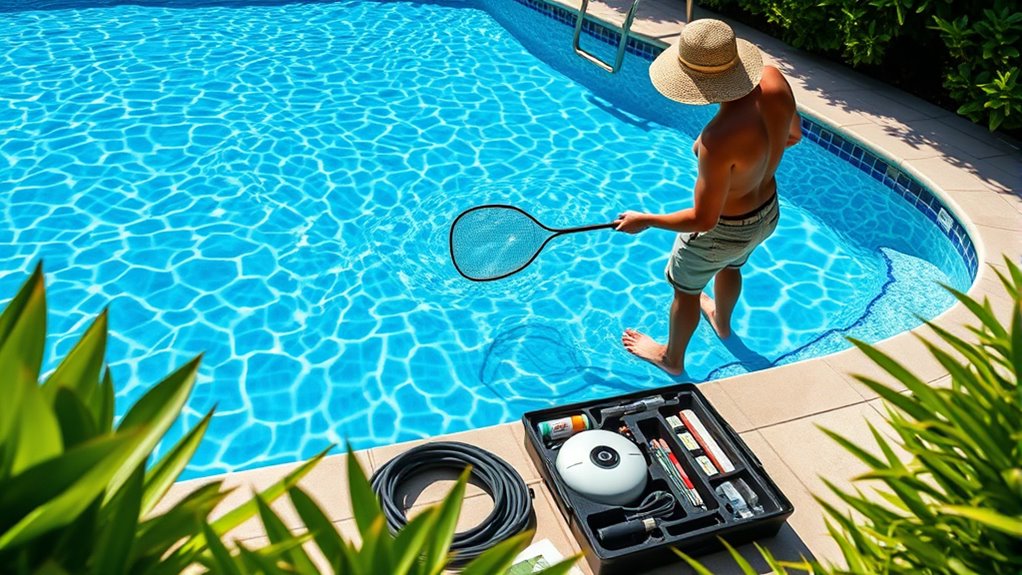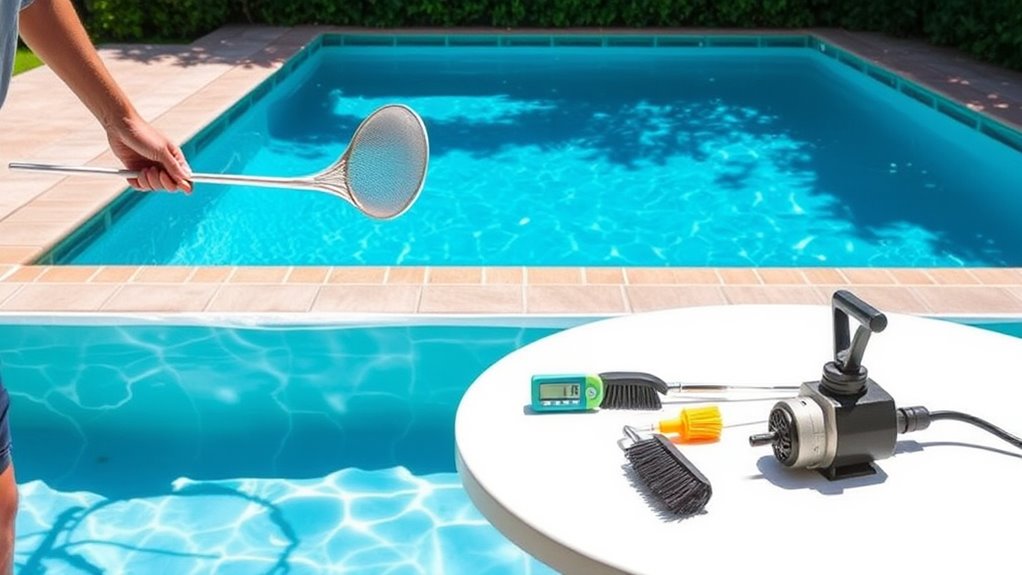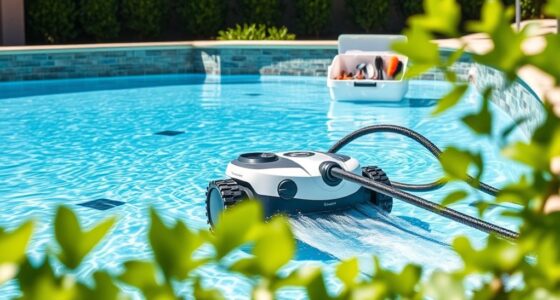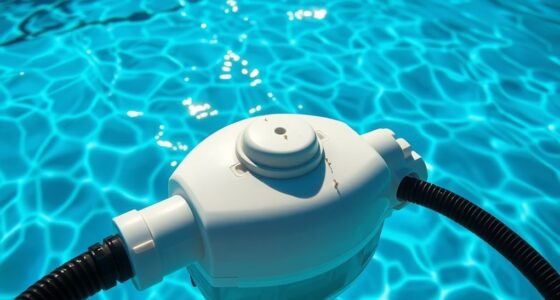You can handle routine pool tasks like testing water, adjusting chemicals, and cleaning filters yourself, saving money and gaining control over water quality. However, for complex repairs, persistent water issues, or equipment malfunctions, it’s best to call in a professional to avoid further damage. Knowing when to DIY and when to seek expert help keeps your pool safe and functioning smoothly. Keep going to discover more tips on balancing DIY and professional care.
Key Takeaways
- Handle routine tasks like water testing, chemical adjustments, and equipment inspection yourself to save costs and maintain control.
- Call an expert for persistent water chemistry issues, algae outbreaks, or equipment malfunctions that DIY can’t resolve.
- Perform regular equipment inspections and cleaning to prevent issues, but seek professional help for leaks or electrical problems.
- Replacing major components, such as pumps or heaters, should be left to licensed professionals to ensure safety and proper installation.
- Recognize complex repairs or recurring problems as signs to consult an expert, avoiding costly damage or safety hazards.

Maintaining your pool yourself can save money and give you greater control over its cleanliness and safety. When you handle routine tasks like adjusting the pool chemical balance and inspecting equipment, you ensure your pool remains inviting and safe to use. Proper pool chemical balance is essential because it keeps bacteria and algae at bay while preventing skin or eye irritation. Testing your water regularly with test strips or a testing kit allows you to monitor pH, chlorine levels, alkalinity, and stabilizer. If these readings are off, you can make quick adjustments—adding chlorine, pH adjusters, or algaecides—without the need for professional help. These simple steps help maintain water clarity and prevent costly repairs down the line.
Equipment inspection is another critical aspect of DIY maintenance. Regularly checking your pump, filter, skimmer, and other components ensures they operate efficiently. Look for leaks, unusual noises, or signs of wear and tear. Cleaning filters and removing debris from skimmers also fall under this routine. When you perform these inspections yourself, you catch small issues early, avoiding larger, more expensive repairs later. Plus, you develop a better understanding of your system’s needs, which means you can troubleshoot minor problems before they escalate. Additionally, understanding proper maintenance techniques can help prolong the lifespan of your equipment and ensure optimal performance.
However, some tasks should be left to the professionals. If you notice persistent equipment malfunctions, such as persistent leaks, persistent low water levels, or electrical issues, it’s best to call an expert. Similarly, if your water chemistry is consistently out of balance despite your efforts, or if algae blooms keep recurring, a professional can diagnose underlying issues more accurately and suggest effective solutions. Handling complex repairs or replacing major components, like a faulty pump motor or heater, is also best left to licensed technicians. These tasks require specialized tools and knowledge to guarantee safety and proper functioning.
Ultimately, DIY pool maintenance offers significant benefits when you’re comfortable managing basic tasks like testing water chemistry and inspecting equipment. These routines are manageable with a little education and regular attention, allowing you to save money and extend the lifespan of your pool. For more complicated repairs or persistent problems, however, calling a professional is a smart move, preventing potential hazards and costly mistakes. Balancing DIY efforts with professional help when needed ensures your pool stays in top condition, safe, clean, and ready for enjoyment all season long.
Frequently Asked Questions
How Often Should I Check My Pool’S Chemical Levels?
You should check your pool’s chemical levels at least twice a week. Focus on maintaining proper chlorine levels to keep the water sanitized, and monitor pH balance to prevent irritation and equipment damage. Regular testing helps you catch imbalances early, ensuring clear, safe water. If the levels are consistently off or you’re unsure how to adjust them, it’s a good idea to call an expert for professional assistance.
What Are Signs My Pool Needs Professional Cleaning?
Spotting signs your pool needs professional cleaning is simple. If you notice persistent pool algae, which can turn your water cloudy, or if water clarity worsens despite regular maintenance, it’s time to call in the pros. Poor water circulation, lingering odors, or stubborn stains also indicate that a professional deep clean is necessary. Don’t delay—professional help guarantees your pool is pristine, safe, and sparkling for swimmers.
Can I Fix a Leaking Pool Myself?
If your pool is leaking, you might consider fixing it yourself if you’re comfortable with equipment repair and understand pool chemistry. Start by locating the leak, maybe around fittings or the liner, and then seal or replace damaged parts. However, for complex leaks or issues involving plumbing or structural damage, it’s best to call an expert. Proper maintenance guarantees your pool remains safe and functional, whether you DIY or hire a pro.
What Equipment Do I Need for DIY Pool Maintenance?
Think of pool maintenance equipment like a toolbox for a DIY project. You’ll need a pool filter to keep water clean, a pool skimmer to remove debris, and a hose for water adjustments. Additionally, consider a test kit to monitor chemical levels, a brush for cleaning the pool walls, and a pump for circulation. With these essentials, you’re ready to keep your pool sparkling and inviting all season long.
How Do I Troubleshoot Common Pool Pump Issues?
When troubleshooting common pool pump issues, start with pool filter troubleshooting by checking for clogs or debris that could impair flow. Listen for unusual pump noise diagnosis—loud or grinding sounds often indicate a problem. Confirm the pump is properly primed and the valves are open. If these steps don’t resolve the issue, it’s time to call a professional to avoid further damage or safety risks.
Conclusion
Knowing when to DIY or call a pro is like steering through a maze—you need to recognize the right turns and dead ends. If your pool only needs simple skimming or chemical checks, you can handle it yourself and keep your oasis sparkling. But when issues get complex or out of your depth, don’t hesitate to bring in an expert—think of them as your pool’s seasoned guide, ensuring your backyard retreat stays pristine and inviting.










